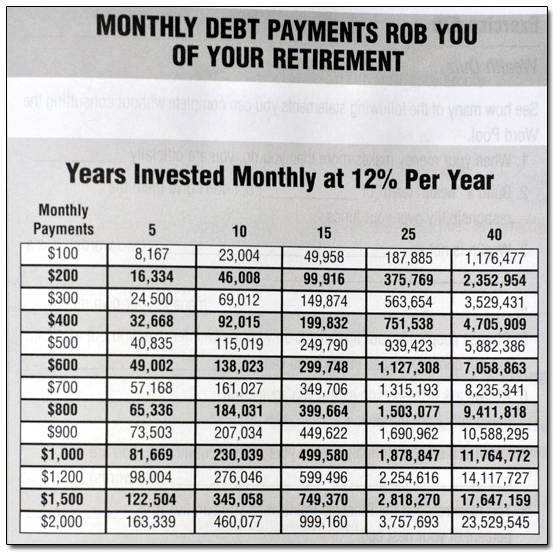This, friends, is easily the one thing about Dave Ramsey that pisses me off the most. This particular table comes from Dave’s Total Money Makeover Workbook, page 229:

The point of that data is pretty simple: If you’re not making payments to anyone other than yourself, AND if you’re willing to work hard, you can accumulate a lot of money in a pretty short amount of time.
Now, I agree with that premise wholeheartedly. Heck — I’m seeing it play out in my own life. Our only debt payments go to the mortgage company, and further, those same mortgage payments (15-year, fixed-rate loan) take up less than 15 percent of our monthly take-home income. (For those who care, Dave’s recommended upper boundary for mortgage payments is 25 percent of take-home pay.)
So, because there aren’t any car payments or student loans or credit-card debts sucking cash out of our accounts, we have a lot of leeway in directing our money where we want it to go.
No, my problem is with the “12 percent returns” Dave loves to talk about SO VERY OFTEN. And, as noted by the chart above, use as a reference point in his books.
Here’s the text that accompanies the chart:
Exercise #69
Consult the chart below.
- Determine how many years you have to retirement … or to the place you’d like to set as your Pinnacle Point.
- Determine how much you have to invest each month to get there.
At your current rate of investing, how long will it be before you reach the Pinnacle Point? Are you willing to invest more each month?
Oy.
“Invest your money in good growth-stock mutual funds,” Dave always tells radio listeners, “and in twenty years, earning twelve percent a year, you’ll be a fobzillionaire!” Or something along those lines.
Well, yeah. At annual earnings of 12 percent, the math works.
But it’s getting that “average 12 percent per year” return that might cause some consternation.
Like It’s a Given
Dave throws this figure out there constantly. Like it’s inevitable. Like it’s a given.
That, at least, is how I hear it.
And it never fails to make me cringe. (As I’ve mentioned before.)
It seems to me that when you’ve had a few decades of economic “growth” built upon declining and/or stagant wages for the lower and middle classes, coupled with repeated injections of massive debt at every level of society — how else to make up the difference and still keep asset prices high? — then it’s at least worth considering that maybe investment returns going forward will come with a level of risk that’s not conducive to double-digit expectations.
Am I alone in this thinking?
Because some days — like when I come across the chart above — it sure feels like it.


Travis@Plain Money Talk wrote:
Totally agree with you here. I’ve recently been reading Financial Peace Revisited and thought the same thing. Now this book was written a while ago, according to the dates in the book, so at the time it may not be outrageous from a 15 year historical perspective. That being said I think it is crazy to think that we will continue to easily get that grow rate going forward. We are no longer a developing nation and the historical gains will not be mirrored anytime soon unless we have another major economic shift.
MBTN wrote:
The funny thing is that 12% isn’t even the historical returns for the stock market. The historical return for the S&P 500 is only about 8%.
FT wrote:
The chart of monthly investment is beautifully explained the same it’s explained in a book called parabel of a pipeline. The earlier you start you have advantage the visible difference can be seen in returns of 40 years been much much higher in percentile as compared to 25 years.
Robb wrote:
It’s very easy to be critical of the 12% figure with respect to the last 5 years. But, you have to look at it long term. If you count on a 12% return each year for a given 3-5 year period, that is insane, and it is understandable why people get so worked up about it when they think that way. History has shown that it goes up and down every year. One year it may go down 5%, but then the next year it could go up 20%. Ramsey stresses this over and over.
When you look at the long term growth average, 12% is a very reasonable number. It just doesn’t seem reasonable when everyone has their panties in a wad after the mortgage cluster %#$. I personally have money in a mutual fund that has averaged just 12.11% per year (as of September 2010), since 1934. Sure, the last few years sucked, but history tells us there are ups and downs and to expect them.
If you’re going to view economic growth objectively and make a long term forecast by modeling historical data, an 8% average over the long term would be too low in my opinion.
Also, here are 27 examples of funds with around a 12% return since inception:
http://www.smartmoney.com/investing/mutual-funds/27-funds-with-good-returns-since-inception/
CC wrote:
As Robb wrote, there are plenty of mutual funds that have performed 12% or better for long periods of time.
Someone commented that the S&P has only averaged 8% a year. Even if that were true (it’s not), it’s not the end of the discussion. For example, there’s a T Rowe Price small cap fund that’s averaged a shade under 13%/year since the 1950s.
Saying that the S&P has averaged 8% and therefore 12%/year is impossible is like saying that the average IQ is 100 therefore no one can have an IQ of 140. It’s absurd.